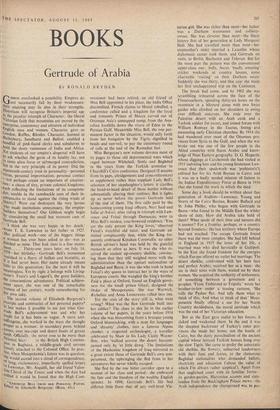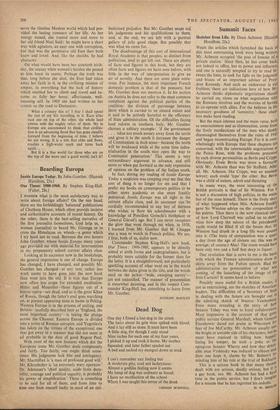BOOKS
Gertrude of Arabia
By RONALD BRYDEN.
G113130N overlooked a possibility. Empires do not necessarily fall by their weaknesses; their undoing may lie also in their strengths. Historians will recognise Britain's imperial age as the peculiar triumph of Character : the liberal Victorian faith that mountains are moved by the enterprise, consistency and altruism of individual English men and women, Character gave us Gordon, Raffles, Rhodes. Character, learned at. Haileybury, Sandhurst and Balliol, enabled a handful of pink-faced clerks and subalterns to hold the dusty vastnesses of India and Africa. .Vet students of our empire's dispersal will have to ask whether the germ of its fatality lay, not ill some alien force or submerged contradiction, but in the very principle of its power Did. the Lnineteenth-century trust in personality—personal Virtue, personal improvisation, personal contact 2---not perhaps create an imperium of amateur- qni; a chaos of tiny, private colonial kingdoms, 'leach reflecting the limitations of its conquista- t7lor, unable in the ramshackle sum of their in- 'At4lequacies to stand against the rising winds of dlistory? Were our destroyers the very heroes O'vho made institutions unnecessary, the empire- „„builders themselves? Out Gibbon ,might begin §Y considering the small but resonant case of `,Gertrude Bell.
think she was very happy in her death,' ''.wrote T. E. Lawrence to het father in 1927. Her political work—one of the biggest things ;'11,, Woman has ever been asked to do--was as finished as mine. That Irak state is a fine monu- , .' Thirty-one years later, onJuly 14, 1958—her birthday—Gertrude Bell's monument vanished in a flurry of bullets and brutality, as If it had never been. Her name already means little to this generation; for the next it will be ttIeaningless. Yet by right it belongs with Living- Stone's. Frere's and Lugard's, the great builders, the conscientious adventurers. Political achieve- 'Tient apart, she was one of the remarkable women of her century, worth remembering for her own sake. The second volume of Elizabeth Burgoyne's excerpts and summaries of her personal papers* 41 last makes it possible to see juSt what Ger- trude Bell'g achievenient was and why her credit for it has been so vague. A stern anti- Wfragette, she worked in the ways she thought Proper to a woman : in secondary posts, behind eettes, over tea-cups and desert feasts of greasy lanai). Officially. she never rose to be more than • Oriental Seer,- to the British High Commis- sion in Baghdad, a middle-grade civil servant f(?c'sely attached to the Colonial Office. In pray- `I.Leei when Mesopotamia's future was in question, ,s11,e would ascend into a cloud of correspondence, ‘,11 Jong, exclamatory, imperfectly spelled letters `? Lawrence, Mr. Asquith, her old friend Valen- t:tte Chirol of the Times; and when the dust had settled it would be found that the High Com- ' Grarattot 131,1 I I ki/NI IIER IttiONAL PAPERS. tdited by Elizabeth Burgoyne. (Berm, 45s.)
missioner had been retired, an old friend of Miss Bell appointed in his place, the India Office discomfited, French claims to Mosul rebuffed, a conference called and a kingdOm for the loyal and romantic Prince of Mecca carved out of Ottoman Asia's unmapped rump, from the Ana- tolian foothills down the river's of Eden to the Persian Gulf. Meanwhile Miss Bell, the one per- manent factor in• the situation, would sally forth from her bungalow by the Tigris, dignified in beads and sun-veil, to pay the customary round of calls at the 'end of the Ramadan fast Miss Burgoyne's new volume devotes most. of its pages to those old departmental- wars which raged between Whitehall, Simla and Baghdad in the years from the 'Turkish armistice to Churchill's Cairo conference. Designed '(I assume from its gaps, abridgements and cross-references) to supplement rather than supplant Lady Bell's selection of her stepdaughter's letters it clarifies the hand-to-hand detail of those battles without. substantially altering their outlines. But it lights up as never before the power Gertrude held at the end of them. The first calls paid by the homecoming young Iraqi officers, Nuri Said and J afar al-Askari, after riding in triumph with Law- rence and Fcisal through Damascus, were to Miss Bell's modest, rose-bowered residence. 'You are the only person the King loves,' observed Feisal's watchful old 'tutor; and Gettrude ad- mitted complacently that, while the King fre- quently embraced Kinahan Cornwallis, no other British adviser's hand was held by the grateful monarch so often as hers. It was' she who re- ceived the' ancient up-country sheikhs, convinc- ing them that they still weighed more with the • administration than the upstart nationalists of Baghdad and Basra; it was she who took in hand Feisal's shy queen to instruct her in the ways of European courts. She wangled the king's brother Zaid a place at Oxford, found an English gover- ness for the small prince Ghazi, designed the Order of Mesopotamia. She was Warwick, Richelieu and Anna Leonowens rolled into one.
Yet the crux of the story still is, what went wrong? What was the flaw Gertrude built into her edifice? The clues to this lie in the earlier volume of her papers, in the years before 1914 when she was blossoming from a brusque young Oxford bluestocking, with a taste for languages and 'dreamy' clothes, into- a famous Alpine climber. a respected archaeologist, a traveller celebrated by Shaw in his Lady Cicely Wayne- flete, who 'walked acrorse the desert haccom- panied only by 'er little dawg.' The limitations of the Hashemite, kingdom of Iraq mirrored to a great extent those of Gertrude Bell's own tem- perament, the -upbringing she fled from in her adventures but never wholly escaped.
She fled by the one bitter corridor open to a woman of her class and period: she. embraced the fate and the freedom of the wealthy English spinster. In 1898, Gertrude Bell's life had differed little from that of any well-bred Vic- torian girl. She was richer than most—her father was a Durham ironmaster and colliery- owner. She was cleverer than most—the finest history first of her generation at Lady Margaret Hall. She had travelled more than most—her stepmother's sister married a Lascelles whose diplomatic career took them, and Gertrude on visits, to Berlin, Bucharest and Teheran. But for the most part the pattern was the conventional upper-class one: balls, Ascot, 'madly amusing' cricket weekends at country houses, some ' charitable 'visiting' on their Durham estate. Suddenly she was thirty, and that year she made her first' unchaperoned trip on the Continent.
The break had come, and by 1902 she was scrambling trousered across the face of the Finsteraarhorn, spending thirty-six hours on the mountain in a blizzard alone with two Swiss guides who -climbed on her shoulders to swing over difficult outcrops. She rode over the Palestine desert with an Arab cook and a Turkish soldier for escort, and joined forces with William Ramsay in the Taurus, listing' and measuring early Christian churches. By 1914 she had wandered over most of the Ottoman pro- vinces from Syria to the Gulf, and when the war broke out was one of the few people in the Allied countries with fluent Arabic and know- ledge of Near Eastern geography. D. G Hogarth, whose diggings at Carchemish she had visited in 1911 (advising him and his young lieutenant Law- rence that their spadework was 'prehistoric'), enlisted her for his Arab Bureau in Cairo; and it was on a badly needed mission of liaison to the Indian Expeditionary Force at Basra in 1916 that she found the work in which she died.
Some day .a book should be written about that generation of Arabists—Lawrence, Young and Storrs of the Cairo Bureau, Reader Bullard and St. John Philby, who began with Gertrude in Basra—who found in the Middle East the wilder shore of duty, How did Arabia take hold of them? What needs of their time and natures did it answer? For a -frontier, perhaps, or a country beyond frontiers; the last territory where Europe had not reached. The escape Gertrude found there was the most complex. She had left behind in England ' in 1915 the lover of her life, a married man who died heroically at Gallipoli. In the East she found freedom for the energies which Europe offered no outlet but marriage. The desert sheikhs, confronted with her bare face and perfect Arabic, received her as a man: she ate in their tents with thetn, waited on by their women. She acquired the authority of sexlessness, of something between a governess and a prophet. 'From Trebizond to Tripolis,' wrote her • brother-in-law under a teasing cartoon, 'She rolls the Pashas flat, And tells them what to think of this, And what to think of that.' Meso- potamia finally offered a use for her North Country decidedness, the moral certitude which was the end of her Victorian education.
But as the East save outlet to her forces, it slaked and weakened them. In the end it was the sleepiest backwater of Turkey's outer pro- vinces she made her home; not the bustle of Cairo, but the dusty parochialism of the ancient capital whose latticed Turkish houses hung over the stow Tigris. She came to prefer the autocratic old sheikhs, the flowery, unhurried landowners with their fans and fezzes, to the clamorous Baghdad nationalists who demanded ballots, electricity and education ('about the value of which I'm always rather sceptical'). Apart from that anglicised court with its familiar forms— its garden-parties, Harrovian accents and state- landau from the Buckingham Palace mews--the Arab independence she championed was to pre-
serve the timeless Moslem world which had pro- vided the lasting romance of her life. As her energy waned, she trusted more and more to her old friend Nuri Said: he might have a short way with agitators, an easy one with corruption, but that was the permissive old East they both knew and loved. And, like the sheikhs, he had character.
On what would have been her ninetieth birth- day, the uneasy white woman's burden she passed to him burst its seams. Perhaps the truth was that, long before she died, the East had taken away her faith in it, in the civilising mission of empire, in everything but the luck of history which enabled her to climb and travel and be- come so fully her bossy, affectionate, well- meaning self. In 1905 she had written to her cousin on the road to Damascus:
What a country this is! I fear 1 shall spend the rest of my life travelling in it. Race after race one on top of the other, the whole land strewn with the mighty relics of them. We in Europe are accustomed to think that civilisa- tion is an advancing flood that has gone steadily forward from the beginning of. time. I believe we are wrong. It is a tide that ebbs and flows, reaches a high-water mark and turns back again. . . .
But it is a fine world for those who are on the top of the wave and a good world, isn't it?































 Previous page
Previous page